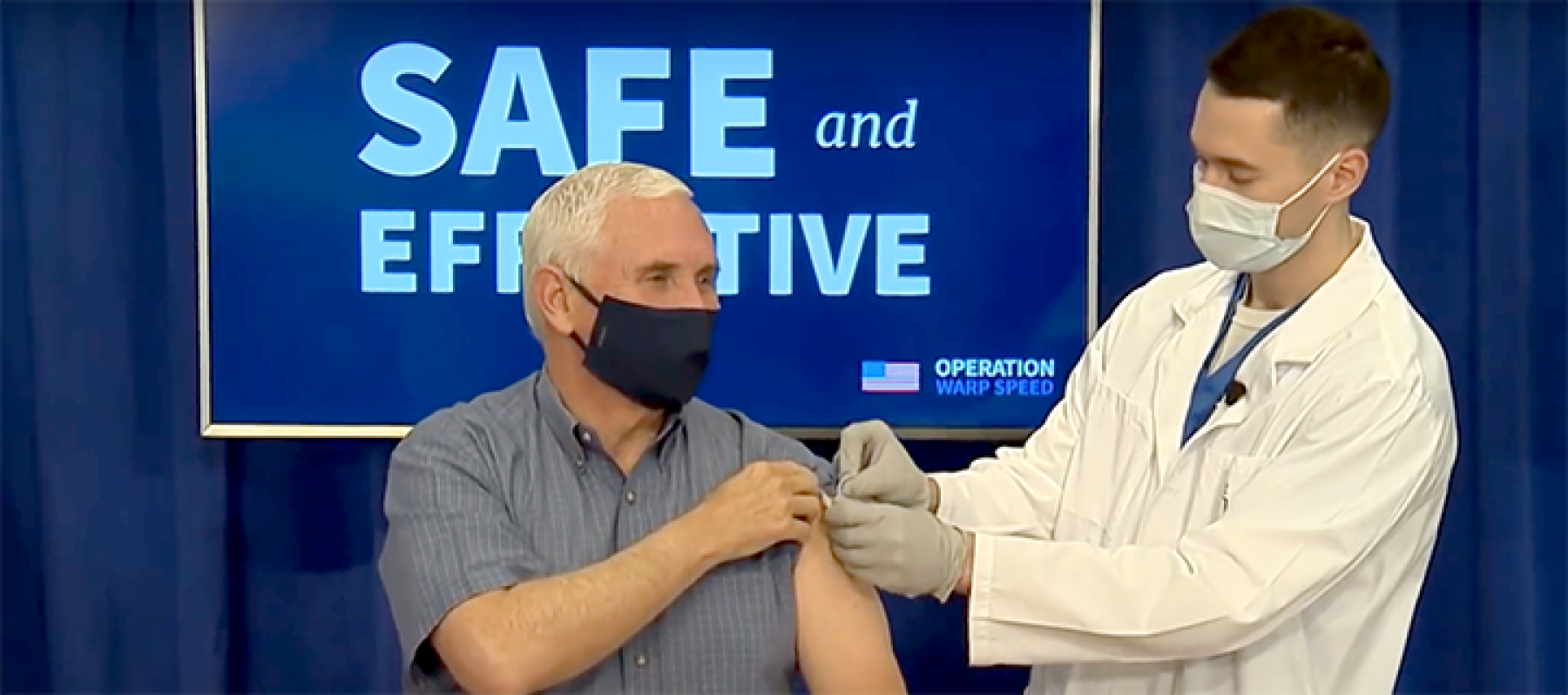Addressing Vaccine Hesitancy Among Republicans

Former Vice President Mike Pence receives his COVID-19 vaccine in front of TV cameras at the White House in December. Republicans are more likely to be skeptical about receiving vaccines, and recent polls say they trust their doctor more on the topic than they do political leaders.
When it comes to vaccine hesitancy, we need to talk about the elephant in the room: Republican voters.
Public health efforts have begun focusing COVID-19 vaccine outreach efforts on those who have been disproportionately affected by the disease. This includes groups that have a distrust of the medical establishment that’s grounded in historical experience, such as Black communities that have been neglected or even unwittingly subjected to harmful experiments. Other outreach messages speak to people who have been swayed by misinformation on social media about the safety and effectiveness of vaccines.
But pollsters and journalists have begun to notice the largest group of vaccine hesitators. A pair of recent national polls shows that 43% to 45% of self-identified Republicans say they probably will never get a COVID-19 vaccination. That compares to just 5% to 7% of Democrats in the polls by Monmouth University and Quinnipiac University. Other pollsters have found a similar partisan split.
The COVID-19 vaccines have been extraordinarily effective. Only 5,800 COVID infections have been identified in the 77 million Americans who are fully vaccinated, according to the Centers for Disease Control and Prevention. And with all adults in the U.S. eligible to receive a vaccine this week, the end of the pandemic’s burden here in our nation is within our reach. But it won’t come quickly if a large group continues to refuse the vaccine.
Public health people find it complicated to talk about political identity. We at CHI sure do. We think health should be apolitical, and we have been dismayed to see the best available tools for disease control — masks, distancing, vaccines — become politicized. The good news is that we have the knowledge and the means to address vaccine hesitancy among Republicans.
Stephen Hawkins directs research on partisanship and polarization for More in Common, a nonprofit dedicated to strengthening democratic societies against the threats of polarization and division. He said he been thinking about this problem for several months.
“This challenge sits within the context of a much broader distrust among Republicans in the media, in government, and in academia. These institutions are, to varying degrees, tainted by their perceived association with a liberal, ‘globalist’ agenda that cares more about achieving goals than telling the truth,” said Hawkins, who spoke at CHI’s Hot Issues in health conference in 2019.
Hawkins said the complaints of bias have a degree of validity, which we should acknowledge while still emphasizing the safety of the vaccines.
Republicans aren’t the first group to be leery of vaccines. The techniques used to convert skeptics aren’t much different from what has worked in the past. What works is active listening, providing consistent facts, not shaming, and using trusted messengers, especially doctors.
American culture is individualistic, and people want the autonomy to make medical decisions for themselves rather than having authorities tell them what to do. Conservative vaccine skeptics share this mindset with their liberal peers.
The messages, however, need to be tailored for a conservative audience. Fortunately, someone has already done the groundwork. The de Beaumont Foundation and Republican pollster Frank Luntz conducted focus groups and surveys to discover the messages that resonate with conservatives. Here are some practical tips:
- Conservative hesitators want more data on long-term side effects of vaccines, and they worry about the speed with which the vaccines were approved. It helps to explain that regulators didn’t cut corners on safety — they cut red tape and bureaucracy to accelerate vaccine availability.
- Positive motivators include the promise of returning to normal daily life — no masks, no social distancing, no public health limits on businesses.
- Warnings of the symptoms of “long COVID” are also effective motivators. The risk of long-running symptoms can outweigh the perceived risk of a new vaccine.
- Doctors are by far the most trusted messengers — much more so than family members or former President Trump.
Unlike other vaccine issues we have written about, hesitancy among Republicans is not an equity issue or access issue. Supplies are increasing every day, and eligibility is now open to all adults.
But the issue is important because the pandemic won’t be over for any of us unless most of us choose to be vaccinated. That choice is highly personal. Doctors and health advocates can help vaccine hesitators make a choice that benefits everyone by listening to their individual concerns and addressing them not as members of a “herd,” but as individuals who can make their own decisions.
Related Blogs and Research
- Maps, Data, and Community: Ingredients for Vaccine Equity
- Moving the Needle on Vaccine Hesitancy
- Behavior and Morality in the Time of COVID
CHI's work on rapid analysis of current policy challenges is made possible by The Denver Foundation.


